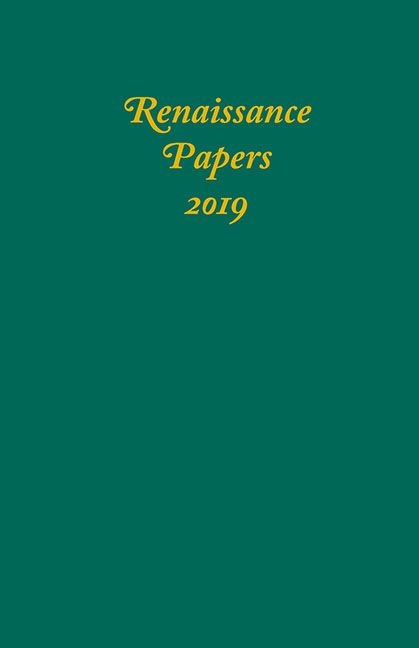Book contents
- Frontmatter
- Contents
- Dedication
- The Names’ Two Bodies: Mary, Queen of Scots, Elizabeth I, and the Politics of Correspondence
- “Of that Wide Gap”: Liminality and the Gap of Time in The Winter’s Tale
- “To kill a Wife with Kindness”: Contextualizing Shakespeare’s The Taming of the Shrew
- The Harvest of Mysticism in English Renaissance Literature: Ascesis in Spenser and Shakespeare— “silencing the tumult of the flesh”
- A House of Spiderwebs: George Herbert and the Estate Poem
- The Judith Narrative in Margaret Tyler’s Mirror of Princely Deeds
- Knowing Owen: Merry and Satirical Epitaphs on a Butler of Christ Church, Oxford
- Margaret Cavendish and Ben Jonson: Ladies’ Spaces, Boy Actors, and Wit
- Parnassus Commodified: Ben Jonson and the Printing of Value
The Judith Narrative in Margaret Tyler’s Mirror of Princely Deeds
Published online by Cambridge University Press: 23 October 2020
- Frontmatter
- Contents
- Dedication
- The Names’ Two Bodies: Mary, Queen of Scots, Elizabeth I, and the Politics of Correspondence
- “Of that Wide Gap”: Liminality and the Gap of Time in The Winter’s Tale
- “To kill a Wife with Kindness”: Contextualizing Shakespeare’s The Taming of the Shrew
- The Harvest of Mysticism in English Renaissance Literature: Ascesis in Spenser and Shakespeare— “silencing the tumult of the flesh”
- A House of Spiderwebs: George Herbert and the Estate Poem
- The Judith Narrative in Margaret Tyler’s Mirror of Princely Deeds
- Knowing Owen: Merry and Satirical Epitaphs on a Butler of Christ Church, Oxford
- Margaret Cavendish and Ben Jonson: Ladies’ Spaces, Boy Actors, and Wit
- Parnassus Commodified: Ben Jonson and the Printing of Value
Summary
Introduction
MARGARET Tyler's Mirror of Princely Deeds and Knighthood, published in 1578, translates Book One of Espejo de Príncipes y Caballeros by Diego Ortúñez de Calahorra, but Tyler makes several changes and additions to the Spanish text she translates. As Joyce Boro's excellent 2014 edition details, most of these changes are in the service of Tyler's English audience, incorporating specifically English vocabulary and literary techniques as well as making English characters and settings more attractive than in the Spanish original. One particular addition, however, has remained perplexing: a standalone reference to “the Jews” that Tyler adds to a chapter title. While there are several possible interpretations of Tyler's addition here, this essay suggests that this reference alludes to the apocryphal story of Judith, with which Tyler's audience would have been familiar.
Chapter 29 of the Mirror bears the following title: “Rosicleer, in Liverba's name, slayeth Argion and removeth the Jews.” As Boro notes, “the removal of the Jews is added to the chapter title, which is very odd since there are no Jews in the chapter, or anywhere at all in the romance.” A little context for this title: in chapter 29, one of the Mirror's protagonists, Rosicleer, undertakes his first battle on his quest to become a knight. Rosicleer has grown up in a monastery and has only recently discovered his true identity as the son of the Hungarian princess Briana and a great foreign knight. In the previous chapter, Rosicleer stumbles on a valley ruled by the evil tyrant Argion; among Argion's most despicable practices is his continual demand for young women “for his carnal liking” (127.89). Liverba is one of the young women Argion requests; Rosicleer disguises himself as a woman in order to take her place, get close to Argion, and slay the tyrant.
As Boro notes, the reference to “the Jews” seems misplaced in this episode. “[R]emoveth the Jews” certainly sounds like an anti- Semitic reference, which of course cannot be ruled out given the expulsion of Jews from medieval England as well as the general rhetoric of distrust that persisted into the early modern era.
- Type
- Chapter
- Information
- Renaissance Papers 2019 , pp. 73 - 84Publisher: Boydell & BrewerPrint publication year: 2020



